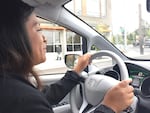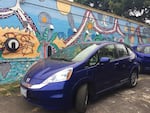
Ana Mendoza unplugs a Honda Fit EV at a low-income apartment complex in Northeast Portland's Cully neighborhood. It's one of three vehicles in a new car-sharing program organized by Hacienda Community Development Corporation and the electric car advocacy group Forth.
Cassandra Profita/OPB / EarthFix
Ana Mendoza grabs her keys and walks out of her apartment at the Hacienda low-income housing complex in Portland’s Cully neighborhood.
She walks across the parking lot and unplugs one of three Honda Fit electric cars that residents and employees here can rent as needed.
It’s a little after 8 a.m., and she’s driving downtown to join a women’s leadership discussion for immigrants from Oaxaca, Mexico, that starts at 9. She doesn’t own a car, so with the car-sharing option at Hacienda she’s already saved herself about an hour of travel time over taking the bus.

Ana Mendoza drives to a panel discussion in a shared electric car based at the Hacienda low-income housing community.
Cassandra Profita/OPB / EarthFix
The Cully neighborhood lies outside the core service territory for mainstream car-sharing companies like Car2Go and the city's bike-sharing program, Biketown.
It also has fewer public transit options than neighborhoods that are closer to downtown. That's why the electric car advocacy group Forth, formerly Drive Oregon, chose to put a new kind of car-sharing program there.
"The Cully neighborhood is really under-served for transit and mobility connections," said Forth Program Manager Zach Henkin. “The people who live here have to rely on transit – and a lot of that connectivity is just not great."
Forth did about of year of research before picking a location for its pilot program, which offers daily electric car rentals for $10 to $12. Henkin said they found some neighborhoods had much bigger transportation challenges than others.
"The farther east we went we found transportation was a bigger and bigger challenge,” he said. "If you look at where the best equipment goes, it goes to the better neighborhoods. If you look where the most frequent bus lines are, oftentimes it's more urban, central neighborhoods – not where the greatest need is."

Hacienda Community Development Corporation teamed up with the electric car advocacy group Forth to bring three EVs to a low-income housing community in Portland.
Cassandra Profita/OPB / EarthFix
A resident and an employee of Hacienda Community Development Corporation, Mendoza was quick to seize the opportunity to rent a low-cost car – even if it was an EV that took some getting used to.
She now knows not to expect any engine noise when she turns the car on. And she's careful to check how many miles she can drive before she runs out of charge.
"I sometimes forget that it's actually on," she said. "The good thing is it warns you when you leave the keys inside and it's still on. The one thing I don't like is knowing that you can't go too far."
Reducing pollution, adding options
Henkin says people in low-income neighborhoods like Cully are often exposed to more air pollution and they have fewer options for getting around. He’s hoping electric car-sharing can help with both problems.
"So, this neighborhood is not high income," he said. "It has a higher-than-average crime rate. It has a higher poverty rate."
And that's why it's not included in many car-sharing service territories, he said. His group wanted to use Getaround technology to rent out its cars in Cully, but was told it wasn't available in that zip code.
"They said if we moved one zip code over, they would have been able to sign us up for the service, and that – that defeats the entire purpose," Henkin said. "It was really unfortunate.”
Getaround company officials did not respond to several interview requests for this story.
Forth's pilot program in Portland uses the Turo car-sharing app instead, but that means more work for the staff at Hacienda to check out the cars, according to asset manager Gena Scott.
"We were actually going to start out with five vehicles,” she said. But that was too many to manage without the technology that allows people to check themselves in and out of the cars. "We couldn’t afford to have someone on staff renting out these cars all the time.”
Scott said Hacienda residents are using the vehicles more and more for things like trips to the grocery store and doctors' appointments.
Transportation injustice
Vivian Satterfield, deputy director for the environmental justice nonprofit OPAL, said as housing costs rise in Portland poor people are getting pushed into the outer edges of the city, where there are fewer, if any public transit or car-sharing options.
"We’re seeing a lot of transportation options being centered into the urban core whether it’s bike share, car share, Zipcar, Getaround," she said. "They’re still concentrated in the urban core of the city. So, it’s problematic that it’s not more widespread and not more available to more people.”
A lack of transportation options means longer travel times and creates an injustice, she said, because it limits people's access to economic, social and educational opportunities. Research shows longer commute times make it less likely poor families will move up the income ladder.
About 40 minutes after she left Hacienda, Mendoza pulled into a parking garage downtown and walked into her her panel discussion 15 minutes early.
Had she taken the bus, she might still have been on the road.
